From the $1 Bill to the capital of America, George Washington’s name appears more often than probably any other name in American history. Being the most prominent Founding Father, everyone learns how Washington led the Continental Army against the British during the War for Independence and eventually became the first President of the United States. But there are plenty of stories and facts that are rarely taught in schools today. Watch the video and then read below about ten facts you probably do not know about George Washington.
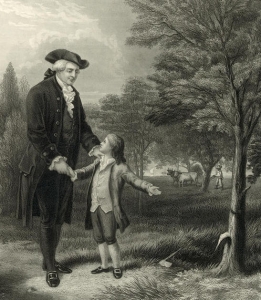 1. George Washington did not chop down a cherry tree.
1. George Washington did not chop down a cherry tree.
“I cannot tell a lie,” a young George Washington is reported to have said—but his biographers sure can! The famous story originates from the 5th edition of the popular biography The Life of Washington the Great by Mason Weems.1 Published in 1806, seven years after Washington’s death, there are no primary sources attesting to its truthfulness. All things considered, its late appearance and the complete lack of evidence has led most to consider it apocryphal.
2. He was most embarrassed about his lack of education and his bad teeth.
The most persistent enemy to Washington were not his political or military opponents, but his teeth. By the time he was sworn in as the first President of the United States he only had a single original tooth left.2 Over the course of his life he had a number of dentures made from a wide variety of materials.3 The dentures of the time were large, bulky, and burdensome which worked together to make Washington quite self-conscience about them leading him to be more introverted than perhaps he might have been.4
On top of this, George Washington did not have the same high level of education his older brothers received due to the death of their father when he was only eleven years old. This tragedy led Washington to become a surveyor (which incidentally provided the exact education he needed to accomplish the amazing things God had planned for him). When standing next to the genius level intellects of Jefferson, Adams, and others it was easy for Washington to feel at an embarrassing disadvantage to his more educated peers.5 That said, Washington was still incredibly intelligent on account of his extensive reading throughout his life in order to make up for his perceived lack of formal education.
 3. He was nominated to be commander of the colonial army by John Adams.
3. He was nominated to be commander of the colonial army by John Adams.
“I do not think myself equal to the Command I am honored with.”6 It was with these words that the ever-humble George Washington accepted the unanimous appointment to command the soon-to-be-created Continental Army. The official vote happened on June 15, 1775, with John Adams credited as being the one who recommended and nominated Washington to the position.7 On the occasion, Adams wrote to his wife explaining how Congress elected the, “modest and virtuous, the amiable, generous and brave George Washington,” and solemnly proclaimed that, “the Liberties of America, depend upon him.”8
4. George Washington was described as being taller than the average man.
In an era when the average man stood at 5’7″, noted early biographer Jared Sparks clocked Washington in at an impressive 6’3″ tall.9 John Adams, later in life, wrote to fellow signer of the Declaration of Independence, Dr. Benjamin Rush, that Washington had, “a tall stature, like the Hebrew sovereign chosen because he was taller by the head than the other Jews.”10
A military observer repeatedly called attention to the vast stature of Washington, explaining, “it is not difficult to distinguish him from all others; his personal appearance is truly noble and majestic; being tall and well proportioned.”11 He continues to write that Washington, “is remarkably tall, full six feet, erect and well proportioned…This is the illustrious chief, whom a kind Providence has decreed as the instrument to conduct our country to peace and to Independence.”12 George Washington was a tall man with an even bigger purpose.
5. He encouraged his troops to go to church.
As General, Washington would issue orders throughout the army instructing them on daily operations. On June 23, 1777, he issued the following order:
“All chaplains are to perform divine service tomorrow, and on every other succeeding Sunday, with their respective brigades and regiments, when their situations will admit of it, and the commanding officers of the corps are to see that they attend. The Commander-in-Chief expects an exact compliance with this order, and that it be observed in future as an invariable rule of practice, and every neglect will not only be considered a breach of orders, but a disregard to decency, virtue, and religion.”13
Being a man of great piety and sincere religion himself, it is no surprise that Washington placed such an extraordinary emphasis on his soldiers’ corporate worship. In fact, when Washington believed the chaplains were not making regular church services a proper priority, he required all the chaplains to come to a meeting to address the issue and then report back to him.14
Washington’s devotion to Christ was so apparent in the camp that the Rev. Henry Muhlenberg, father of Major General John Peter Gabriel Muhlenberg, remarked:
“His Excellency General Washington rode around among his army yesterday and admonished each and every one to fear God, to put away the wickedness that has set in and become so general, and to practice the Christian virtues. From all appearances this gentleman does not belong to the so-called world of society, for he respects God’s Word, believes in the atonement through Christ, and bears himself in humility and gentleness. Therefore the Lord God has also singularly, yea, marvelously, preserved him form harm in the midst of countless perils, ambuscades [ambushes], fatigues, etc. and has hitherto graciously held him in His hand as a [chosen] vessel. II Chronicles 15:1-3.”15
6. He forbade his officers to swear.
Along the same lines as the previous fact, Washington focused on making the American military not only righteous but also respectable. To this end, on July 4, 1775, he issued the following order:
“The General most earnestly requires, and expects, a due observance of those articles of war, established for the government of the army, which forbid profane cursing, swearing and drunkenness. And in like manner requires and expects, of all officers, and soldiers, not engaged on actual duty, a punctual attendance on Divine Service, to implore the blessings of Heaven upon the means used for our safety and defense.”16
7. He was the only President elected unanimously.
After the ratification of the Constitution, the first order of business was to fill the newly created positions of government. The most important question was, “who will be our President?” For the Americans of 1789, that was apparently an easy answer. “George Washington of course!” With that resolution, Washington, “by no effort of his own, in a manner against his wishes, by the unanimous vote of a grateful country.”17 In the history of the United States, there has been only one other unanimous vote for President — Washington again for his second term.18
8. George Washington added “So help me God” to the Presidential Oath of Office.
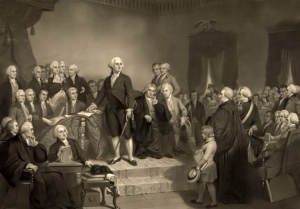 Article II, Section 1, of the Constitution states that when the President is sworn into office, he is to say the following oath:
Article II, Section 1, of the Constitution states that when the President is sworn into office, he is to say the following oath:
“I do solemnly swear (or affirm) that I will faithfully execute the Office of President of the United States, and will to the best of my Ability, preserve, protect and defend the Constitution of the United States.”
With his hand laid upon the open Bible, Washington repeated the oath. He then sealed the oath by with a solemn, “so help me God,” and reverently bowed down and kissed the Bible.19 One eyewitness to the event recalled that, “it seemed, from the number of witnesses, to be a solemn appeal to Heaven and earth at once.”20
9. He was elected to be a vestryman at local churches.
In early American Episcopalian churches, vestrymen were, “a select number of principal persons of every parish, who choose parish officers and take care of its concerns.”21 This included making sure the poor, widows, and orphans were taken care of, and even extended to major decisions about the church as a whole.
George Washington was elected (perhaps his first election) to be a vestryman in two different parishes. In March of 1765, he was chosen in Fairfax Parish with 274 votes, and then four months later he was again chosen in Truro Parish with 259 votes.22 Washington was extremely active as a vestryman.23
On one occasion, Washington even went toe-to-toe with George Mason (fellow future delegate to the Constitution Convention) about relocating the church to a new site. After an impassioned speech by Mason which seemingly settled the question, Washington unassumingly rose and used a surveying map to show where the new site would be and how it would be better for each parishioner. This sudden recourse to sound reason and just sensibilities restored the council to their senses and they voted with Washington to move the church to the new site.24
10. George Washington was killed by his doctors.
This characterization might be a little uncharitable—the doctors were doing the best they could with the knowledge they had—but it doesn’t mean it’s not true. The old General fell sick after riding out on Mount Vernon during the cold rain. Soon, he was struggling to breathe. The following is taken from the journal of George Washington’s lifelong friend and physician, James Craik:
“The disease commenced with a violent ague, accompanied with some pain in the upper and fore part of throat, a sense of stricture in the same part, a cough, and a difficult rather than paint deglutition, which were soon succeeded by fever and a quick and laborious respiration. The necessity of blood-letting suggesting itself to the General, he procured a bleeder in the neighborhood, who took from his arm, in the night, twelve or fourteen ounces of blood.”25
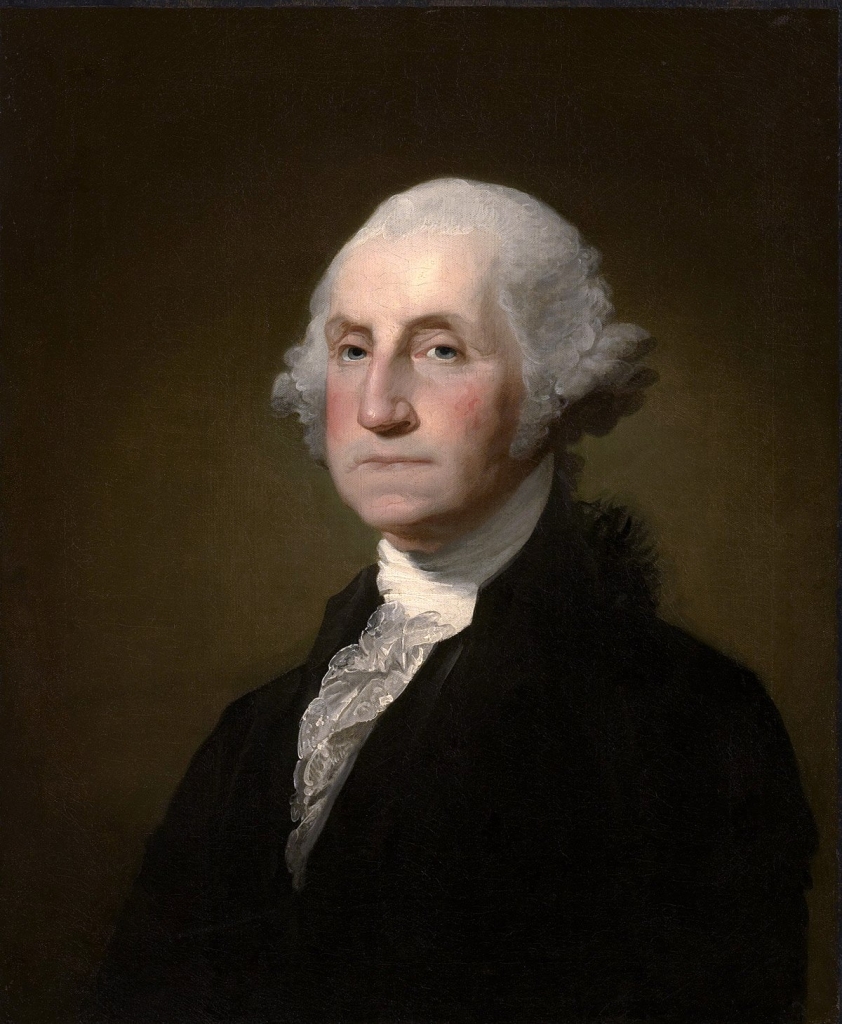 Medical science at the time thought that a number of sicknesses were caused because of some issue with the person’s blood itself. To fix the disease, therefore, a common “solution” would be to bleed a patient out in order to get rid of the bad blood.
Medical science at the time thought that a number of sicknesses were caused because of some issue with the person’s blood itself. To fix the disease, therefore, a common “solution” would be to bleed a patient out in order to get rid of the bad blood.
Once more doctors had been called to the scene, Craik continues:
“In the interim were employed two copious bleedings; a blister was applied to the part affected, two moderate doses of calomel were given, and an injection was administered, which operated on the lower intestines—but all without any perceptible advantage; the respiration becoming still more difficult and distressing.”26
Even more blood was taken, and now the doctors applied hot irons to his throat because they thought that an accumulation of blood in Washington’s throat was what caused the difficulty breathing. Calomel is a kind of mercury chloride, which, we now know to be quite toxic! This, along with the bleedings and the injections were a long way off from helping Washington recover. But the doctors weren’t done yet:
“Upon the arrival of the first of the consulting physicians, it was agreed… To try the result of another bleeding, when about thirty-two ounces of blood were drawn, without the smallest apparent alleviation of the disease… ten grains of calomel were given, succeeded by repeated doses of emetic tartar, amounting, in all, to five or six grains, with no other effect than a copious discharge of the bowels. The powers of life seemed now manifestly yielding to the force of the disorder. Blisters were applied to the extremities.”27
More blood-letting, more toxic calomel, more blisters. The biggest variation in this round of treatments is that they gave Washington another poisonous substance—emetic tartar. Altogether, it served only to give the dying President diarrhea.
Finally, Dr. Craik relates the end to his friend’s suffering:
“Speaking, which was painful from the beginning, now became almost impracticable; respiration grew more and more contracted and imperfect, till… when retaining the full possession of his intellect, he expired without a struggle.”28
A contemporary doctor estimated the total amount of blood drawn to be, “the enormous quantity of eighty-two ounces, or above two quarts and a half of blood in about thirteen hours.”29 The same doctor goes on to accurately explain that:
“Very few of the most robust young men in the world could survive such a loss of blood; but the body of an aged person must be so exhausted, and all his power so weakened by it as to make his death speedy and inevitable.”30
The average amount of blood in someone of Washington’s size and stature is around 210 ounces. If, as the doctor estimates, somewhere around 82 ounces were taken, then Washington lost nearly 40% of his blood. This amount is nearly tantamount to exsanguination (death by bleeding out), and when combined with the blisters, calomel, emetic tartars, and the various vapors, it appears to be the unfortunate conclusion that the doctors killed George Washington.31
Endnotes
1. Mason Locke Weems, The Life of Washington the Great (Augusta: George P. Randolph, 1806), 8-9.
2. “Washington Tooth Troubles,” Mount Vernon (accessed March 29, 2019).
3. “False Teeth,” Mount Vernon (accessed September 18, 2023).
4. “Washington Tooth Troubles,” Mount Vernon (accessed March 29, 2019).
5. “Education” Mount Vernon (accessed March 29, 2019).
6. June 16, 1775, Journal of the Proceedings of the Congress, Held at Philadelphia, May 10, 1775.
7. John Adams autobiography, part 1, through 1776, Adams Family Papers: An Electronic Archive, Massachusetts Historical Society.
8. John Adams to Abigail Adams, June 17, 1775, Adams Family Papers: An Electronic Archive, Massachusetts Historical Society.
9. Jared Sparks, The Life of George Washington (Boston: Ferdinand Andrews, 1839), 102n.
10. John Adams to Benjamin Rush, November 11, 1807, Founders Online (accessed March 29, 2019).
11. James Thacher, A Military Journal During the American Revolutionary War (Boston: Richardson and Lord, 1823), 37.
12. Thacher, Military Journal, 182-183.
13. George Washington, General Order, June 28, 1777, Records of the Revolutionary War (New York: Pudney & Russell, 1858), 330.
14. Washington, General Order, October 6, 1777, Records of the Revolutionary War, 345.
15. Henry M. Muhlenberg, The Journals of Henry Melchoir Muhlenberg (Philadelphia: The Muhlenberg Press, 1958), III:149, journal entry for May 7, 1778.
16. George Washington, General Orders, July 4, 1775, Library of Congress (accessed September 18, 2023).
17. Washington Irving, Life of George Washington (New York: G. P. Putman & Company, 1857), IV:516.
18. Annals of Congress (1873), 2nd Congress, 2nd Session, 874-875, February 13, 1793; Jared Sparks, The Life of George Washington (Boston: Ferdinand Andrews, 1839), 445.
19. Irving, Washington, IV:475.
20. “Philadelphia, May 8. Extract of a Letter from New York, May 3,” Gazette of the United States (May 9 to May 13, 1789).
21. Noah Webster, “Vestry-man,” American Dictionary of the English Language (1828).
22. Jared Sparks, The Life of George Washington (Boston: Ferdinand Andrews, 1839), 520.
23. “Churchwarden and Vestryman,” Mount Vernon (accessed April 1, 2019).
24. Sparks, Washington, 106.
25. James Craik, “From The Times, A Newspaper printed in Alexandria (Virginia), dated December, 1799,” The Medical Repository (New York: T. & J. Swords, 1805), III:311.
26. Craik, “From The Times” Medical Repository, III:311-312.
27. Craik, “From The Times” Medical Repository, III:312.
28. Craik, “From The Times” Medical Repository, III:312.
29. John Brickell, “Medical Treatment of General Washington,” Transactions of the College of Physicians of Philadelphia (Philadelphia: Printed for the College, 1903), 25:93.
30. Brickell, “Medical Treatment” College of Physicians of Philadelphia, 25:93.
31. For a more technical examination of the medical circumstances surrounding Washington’s death see, Dr. Wallenborn’s, “George Washington’s Terminal Illness: A Modern Medical Analysis of the Last Illness and Death of George Washington,” The Washington Papers (November 5, 1997).
* Originally posted: May 9, 2019
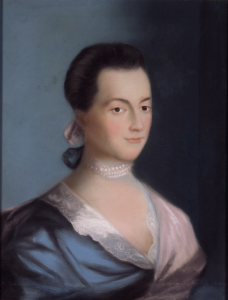 Abigail was born in 1744 to a Congregationalist minister; she had limited formal education, but her self-education was extensive. John Adams, born in 1735, was an attorney when he met Abigail in 1761. After an initial rocky start at their first meeting (John was not impressed with Abigail or her sisters, and Abigail’s mother was not impressed with him), they would court over the course of the next three years. During their courtship, John wrote this letter to Abigail:
Abigail was born in 1744 to a Congregationalist minister; she had limited formal education, but her self-education was extensive. John Adams, born in 1735, was an attorney when he met Abigail in 1761. After an initial rocky start at their first meeting (John was not impressed with Abigail or her sisters, and Abigail’s mother was not impressed with him), they would court over the course of the next three years. During their courtship, John wrote this letter to Abigail:I dare not express to you at 300 miles how ardently I long for your return. I have some very miserly wishes and cannot consent to your spending one hour in town till, at least, I have had you twelve. The idea plays about my heart, unnerves my hand whilst I write, [and] awakens all the tender sentiments that years have increased and matured. (Abigail to John: October 16, 1774 — written when John was serving in the Continental Congress)


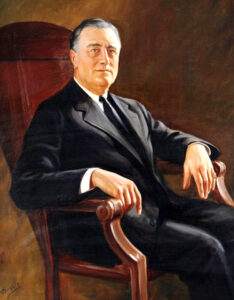 It is because the spirit of unselfish service personified by the life and the teachings of Christ makes appeal to the inner conscience and hope of every man and every woman in every part of the earth. It transcends in the ultimate all lines of race, of habitat, of nation. It lives in the midst of war, of slavery, of conquest. It survives prohibitions and decrees and force. It is an unquenchable Spring of Promise to humanity.
It is because the spirit of unselfish service personified by the life and the teachings of Christ makes appeal to the inner conscience and hope of every man and every woman in every part of the earth. It transcends in the ultimate all lines of race, of habitat, of nation. It lives in the midst of war, of slavery, of conquest. It survives prohibitions and decrees and force. It is an unquenchable Spring of Promise to humanity.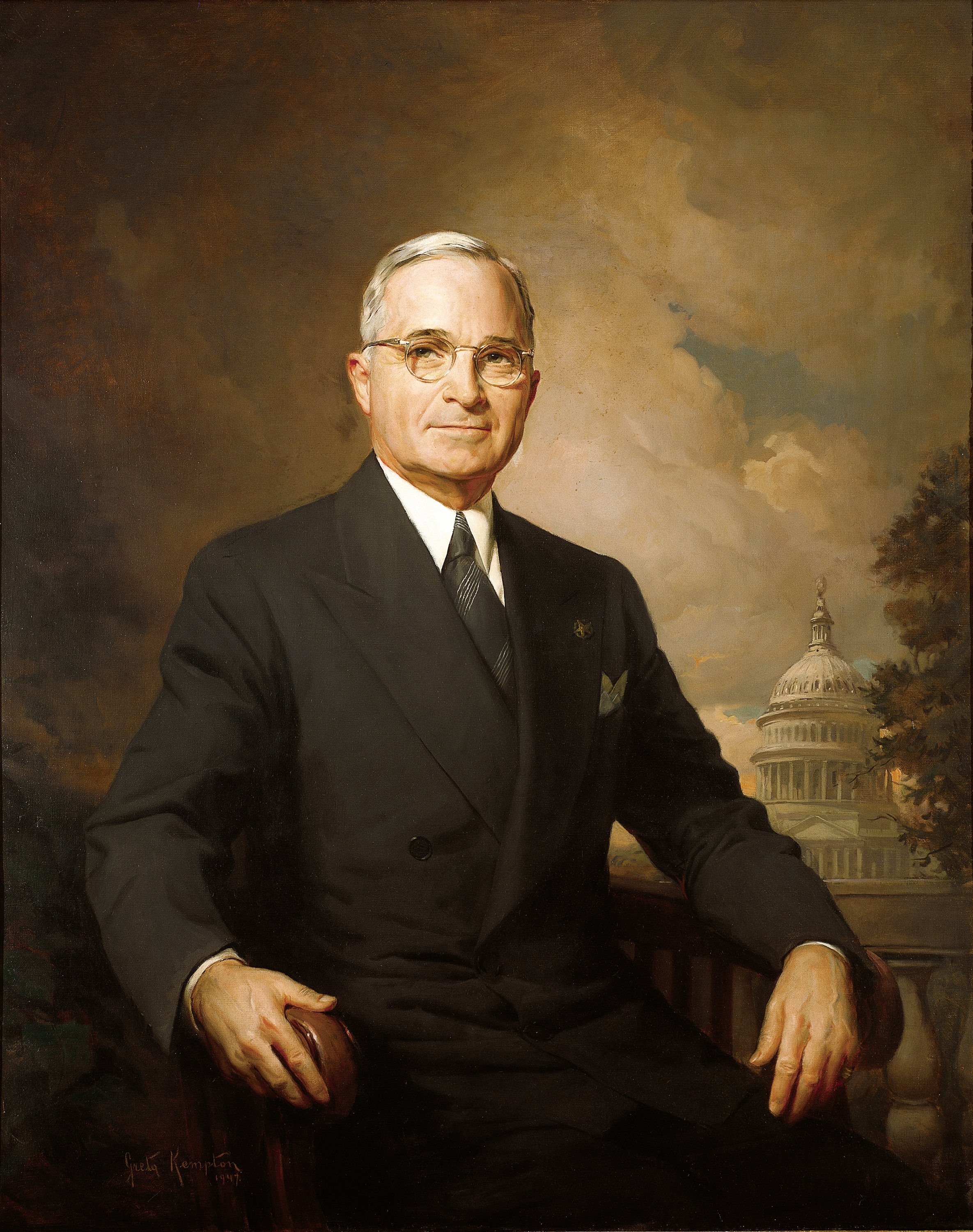 [W]e remember another night long ago. Then a Child was born in a stable. A star hovered over, drawing wise men from afar. Shepherds, in a field, heard angels singing: “Glory to God in the highest, and on earth peace, good will toward men.” That was the first Christmas and it was God’s great gift to us. This is a wonderful story. Year after year it brings peace and tranquility to troubled hearts in a troubled world. And tonight the earth seems hushed, as we turn to the old, old story of how “God so loved the world, that He gave His only begotten Son, that whosoever believeth in Him should not perish, but have everlasting life.”
[W]e remember another night long ago. Then a Child was born in a stable. A star hovered over, drawing wise men from afar. Shepherds, in a field, heard angels singing: “Glory to God in the highest, and on earth peace, good will toward men.” That was the first Christmas and it was God’s great gift to us. This is a wonderful story. Year after year it brings peace and tranquility to troubled hearts in a troubled world. And tonight the earth seems hushed, as we turn to the old, old story of how “God so loved the world, that He gave His only begotten Son, that whosoever believeth in Him should not perish, but have everlasting life.”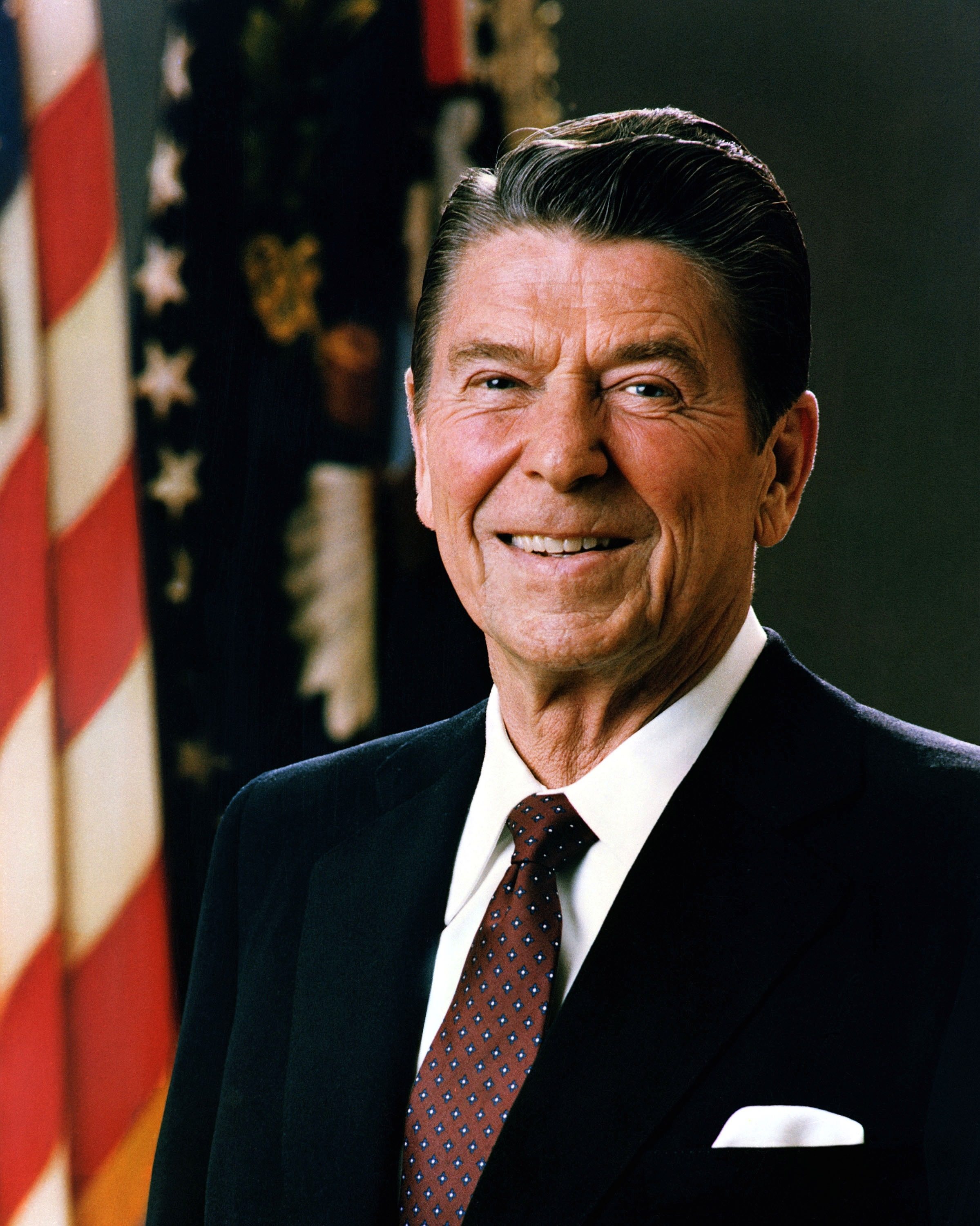 Of all the songs ever sung at Christmastime, the most wonderful of all was the song of exaltation heard by the shepherds while tending their flocks on the night of Christ’s birth. An angel of the Lord appeared to them and said: “Fear not: for, behold, I bring you good tidings of great joy, which shall be to all people. For unto you is born this day in the city of David a Savior, which is Christ the Lord.” Suddenly there was with the angel a multitude of voices praising the Heavenly Father and singing: “Glory to God in the highest, and on earth peace, good will toward men.” Sometimes, in the hustle and bustle of holiday preparations we forget that the true meaning of Christmas was given to us by the angelic host that holy night long ago. Christmas is the commemoration of the birth of the Prince of Peace, Jesus Christ, whose message would truly be one of good tidings and great joy, peace and good will.
Of all the songs ever sung at Christmastime, the most wonderful of all was the song of exaltation heard by the shepherds while tending their flocks on the night of Christ’s birth. An angel of the Lord appeared to them and said: “Fear not: for, behold, I bring you good tidings of great joy, which shall be to all people. For unto you is born this day in the city of David a Savior, which is Christ the Lord.” Suddenly there was with the angel a multitude of voices praising the Heavenly Father and singing: “Glory to God in the highest, and on earth peace, good will toward men.” Sometimes, in the hustle and bustle of holiday preparations we forget that the true meaning of Christmas was given to us by the angelic host that holy night long ago. Christmas is the commemoration of the birth of the Prince of Peace, Jesus Christ, whose message would truly be one of good tidings and great joy, peace and good will.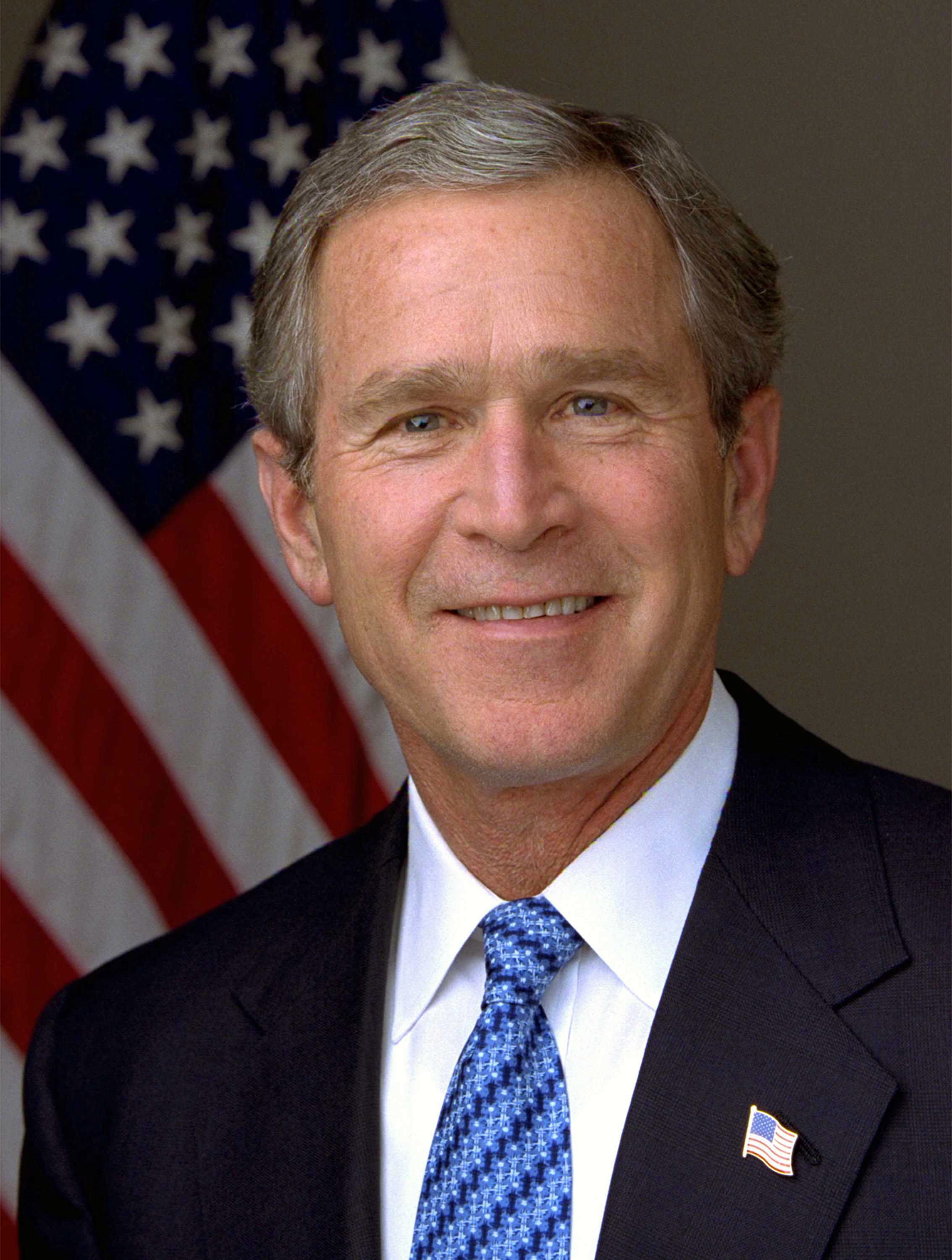 During Christmas, we gather with family and friends to celebrate the birth of our Savior, Jesus Christ. As God’s only Son, Jesus came to Earth and gave His life so that we may live. His actions and His words remind us that service to others is central to our lives and that sacrifice and unconditional love must guide us and inspire us to lead lives of compassion, mercy, and justice. (
During Christmas, we gather with family and friends to celebrate the birth of our Savior, Jesus Christ. As God’s only Son, Jesus came to Earth and gave His life so that we may live. His actions and His words remind us that service to others is central to our lives and that sacrifice and unconditional love must guide us and inspire us to lead lives of compassion, mercy, and justice. (
 1. George Washington did not chop down a cherry tree.
1. George Washington did not chop down a cherry tree. 3. He was nominated to be commander of the colonial army by John Adams.
3. He was nominated to be commander of the colonial army by John Adams. Article II, Section 1, of the Constitution states that when the President is sworn into office, he is to say the following oath:
Article II, Section 1, of the Constitution states that when the President is sworn into office, he is to say the following oath: Medical science at the time thought that a number of sicknesses were caused because of some issue with the person’s blood itself. To fix the disease, therefore, a common “solution” would be to bleed a patient out in order to get rid of the bad blood.
Medical science at the time thought that a number of sicknesses were caused because of some issue with the person’s blood itself. To fix the disease, therefore, a common “solution” would be to bleed a patient out in order to get rid of the bad blood.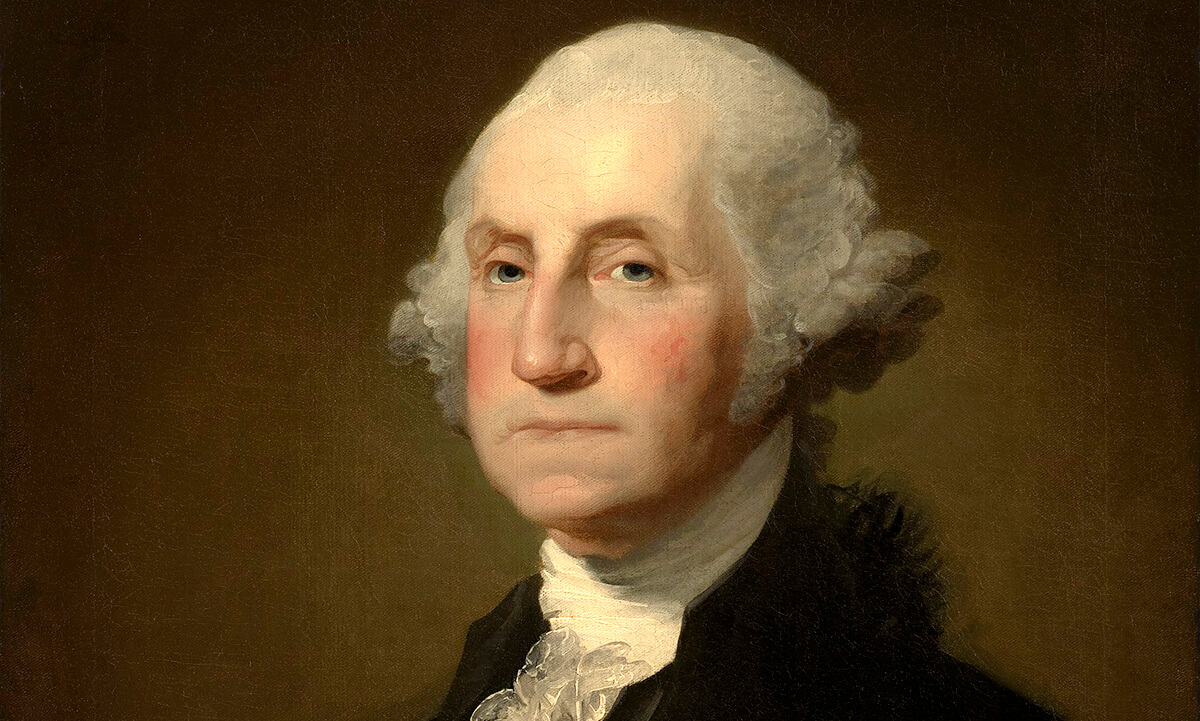
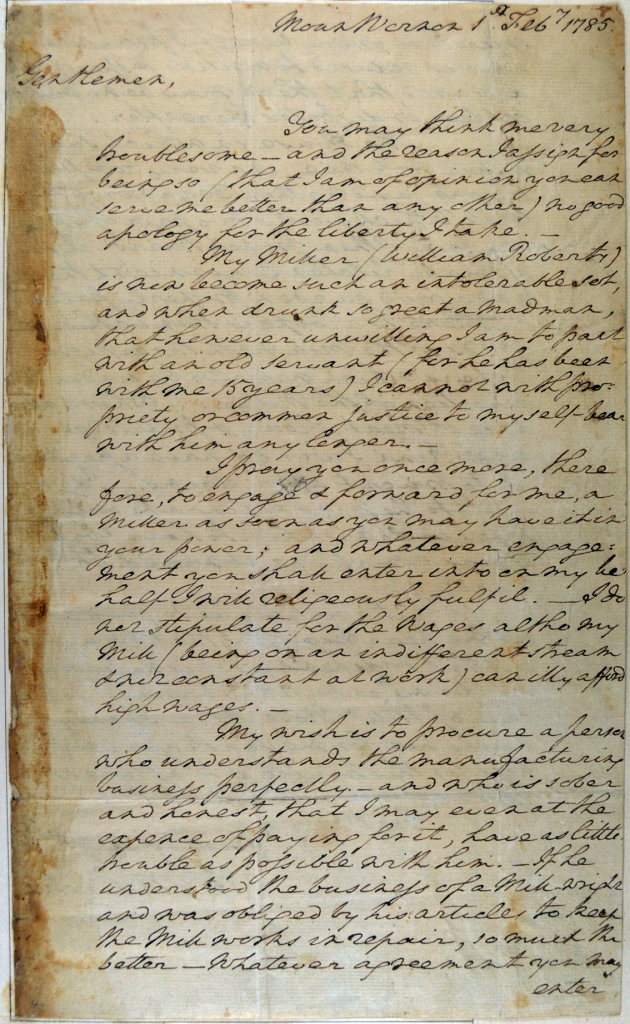
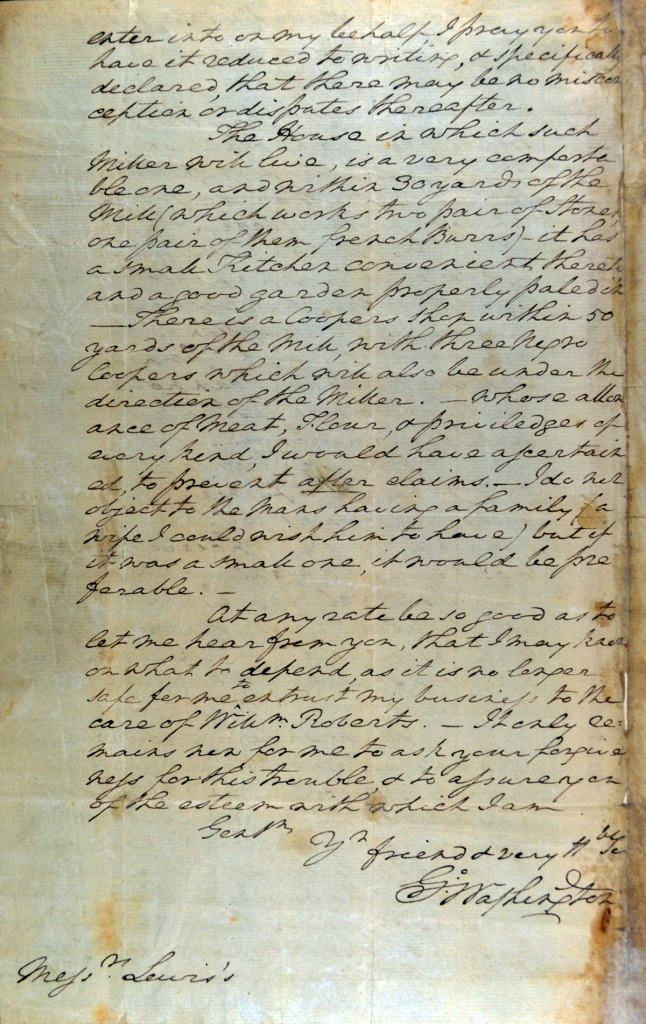
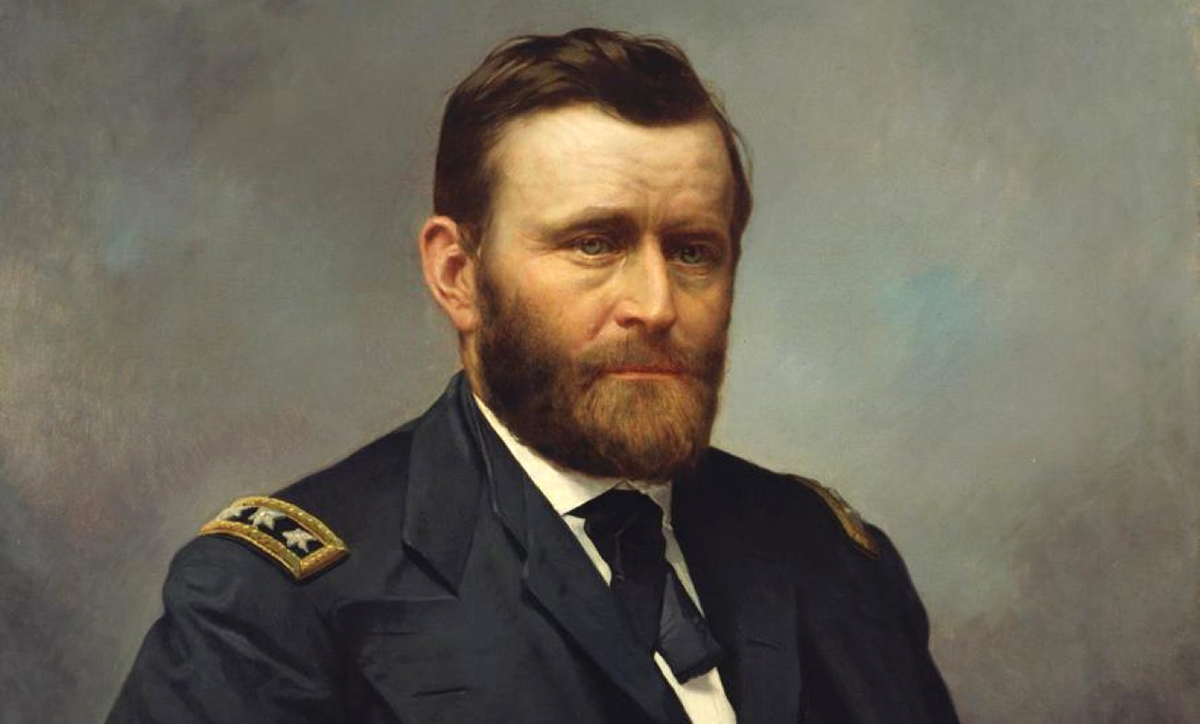
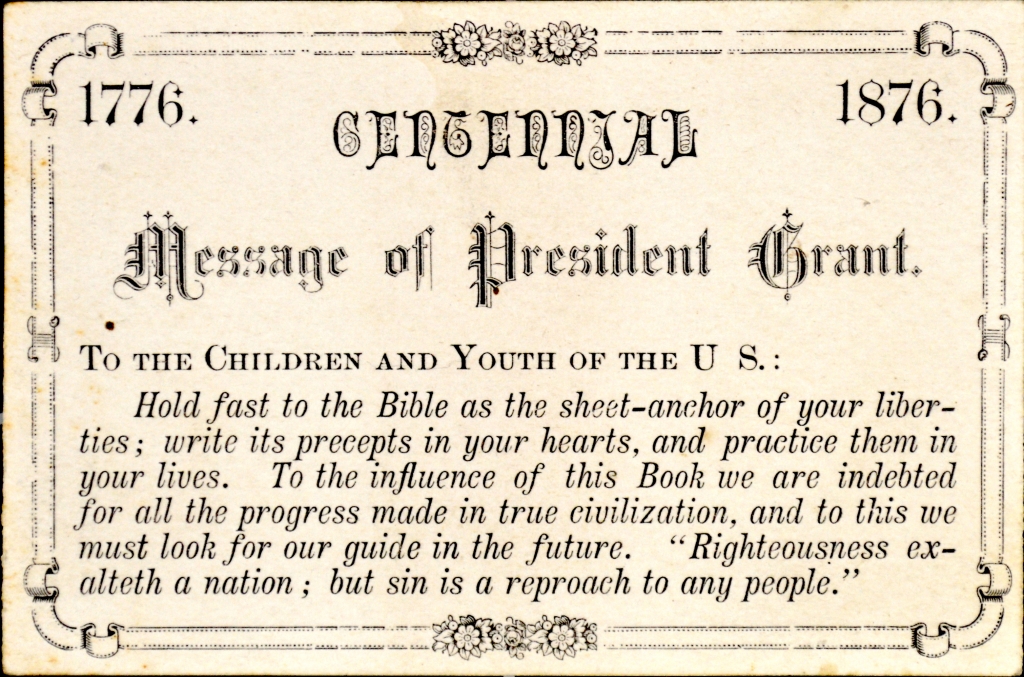
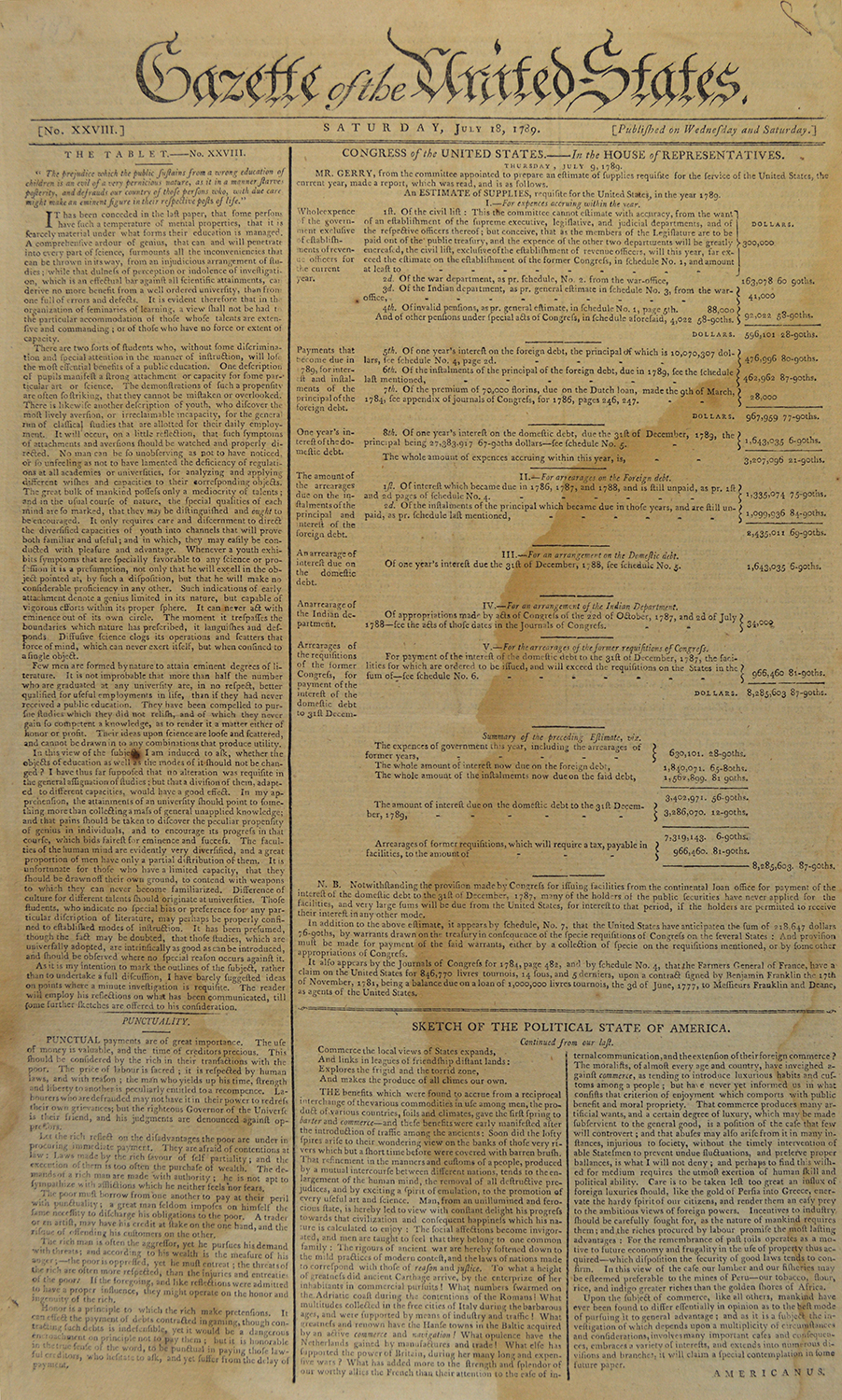
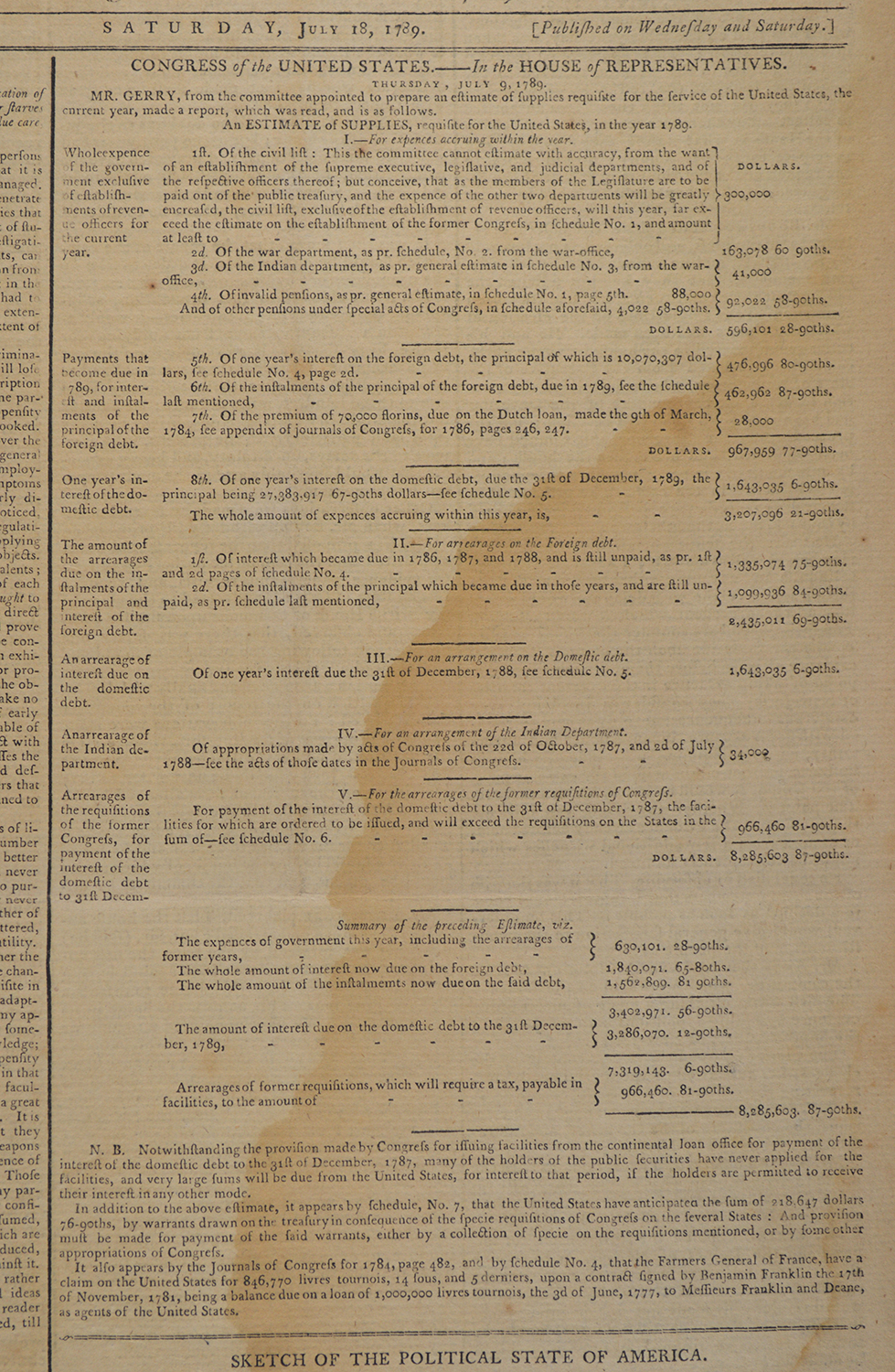

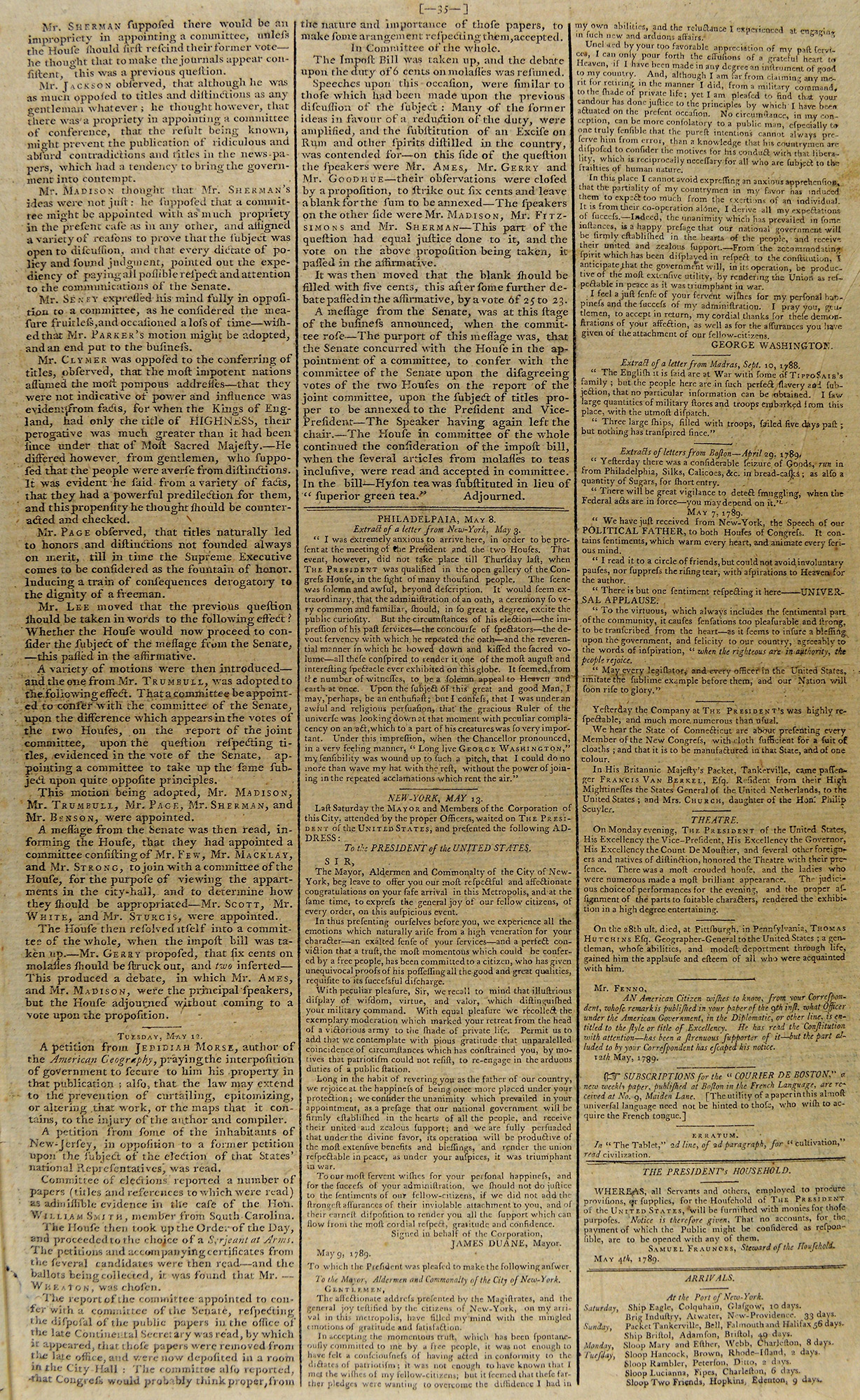
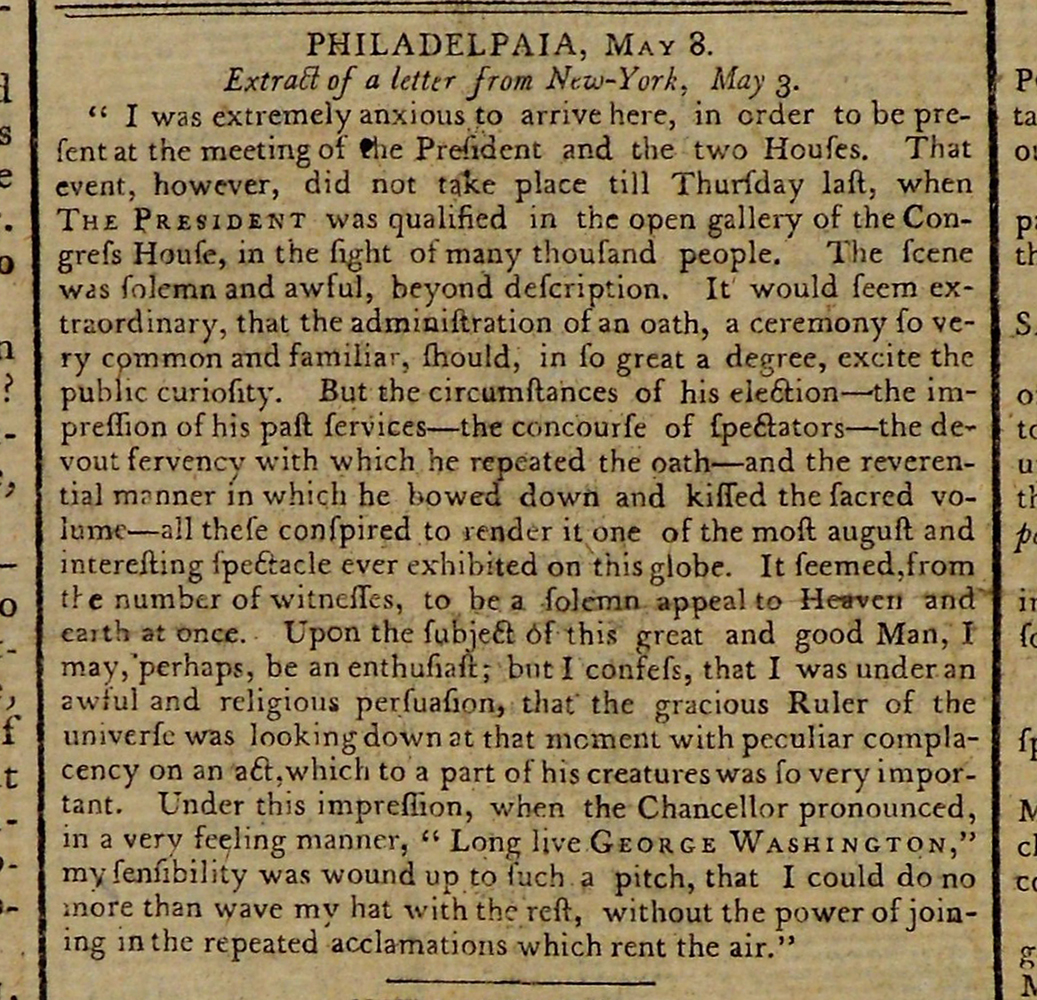
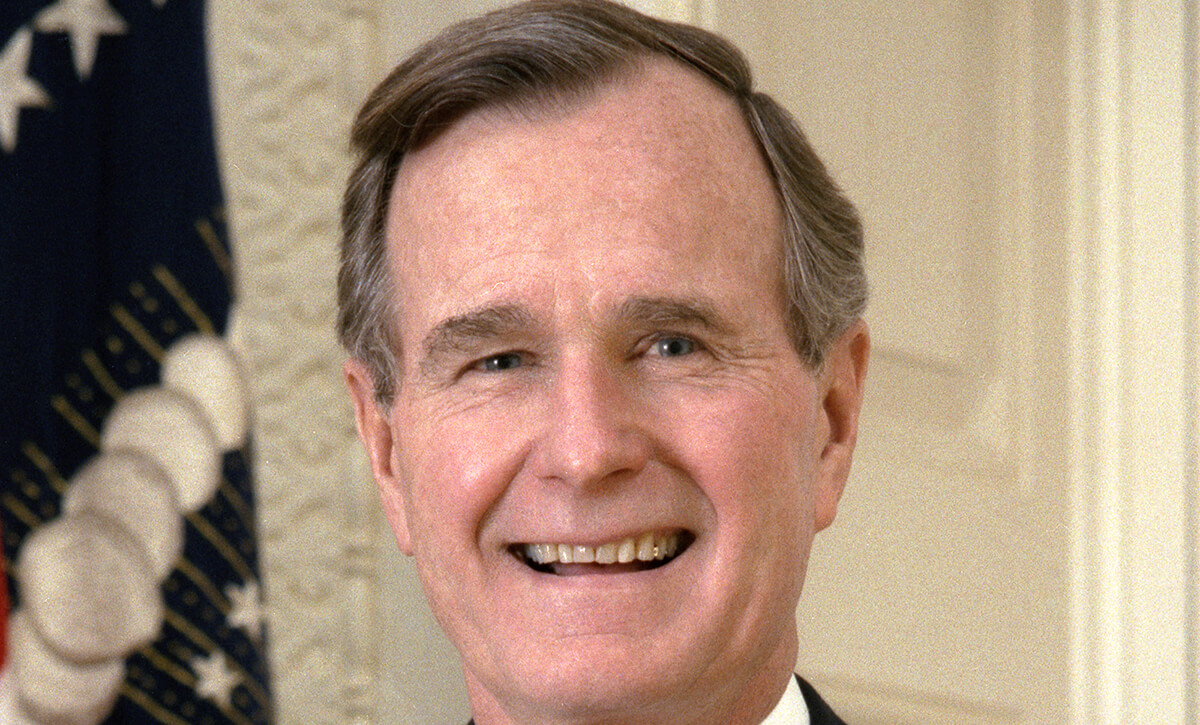
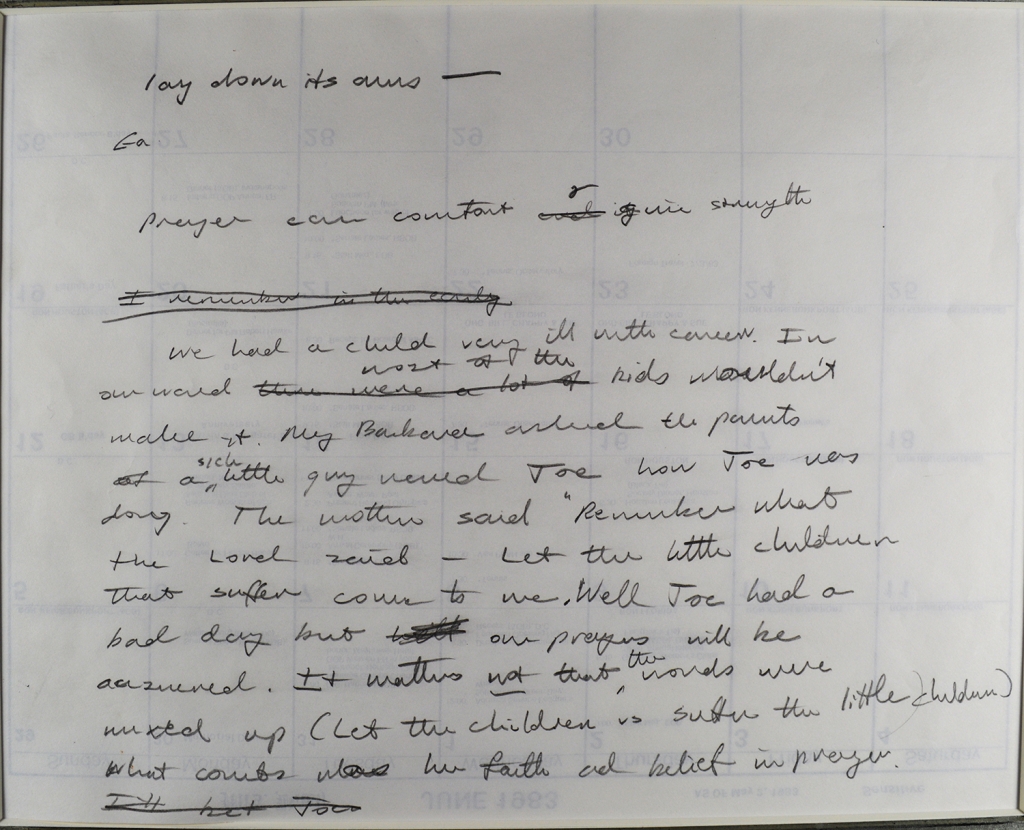
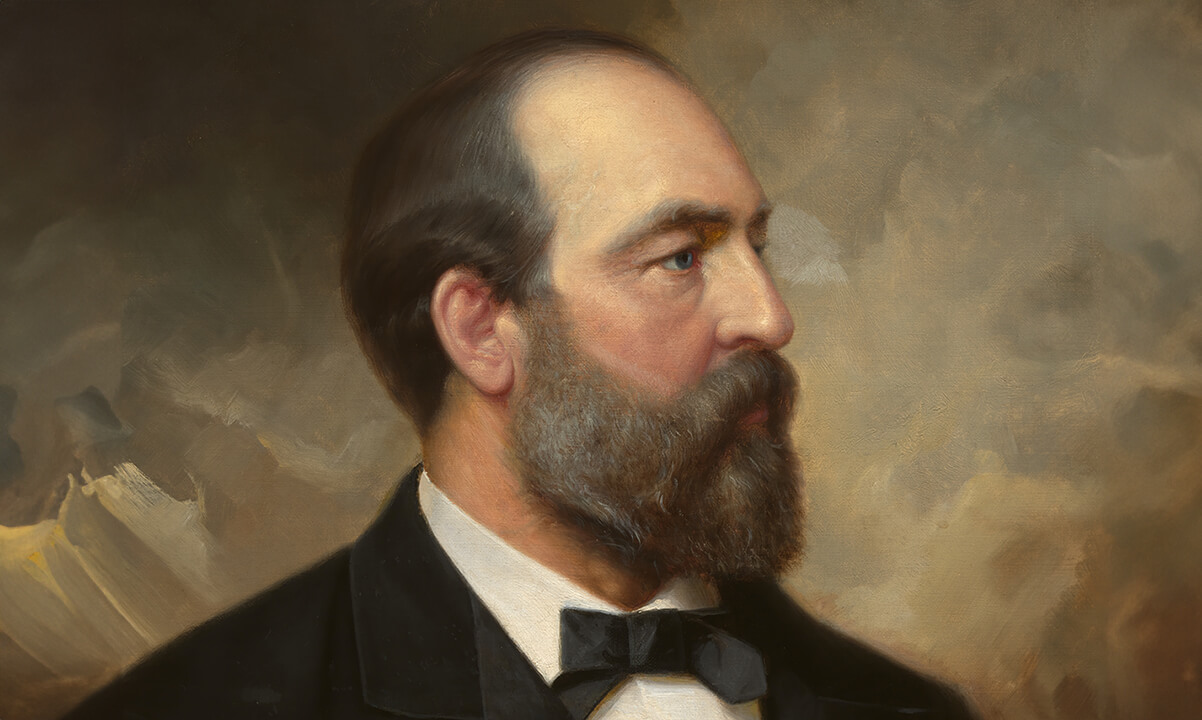
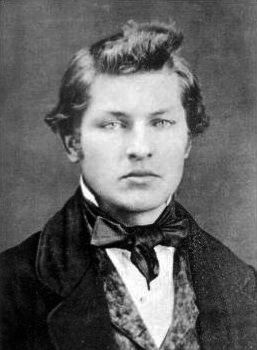 James was awakened out of a very sound sleep…He began to uncoil a rope to steady the boat through a lock it was approaching. The rope caught somehow on the edge of the deck and resisted several pulls that he made to extricate it. At last it yielded but, in the rebound, sent him headlong over the bow into the water…Death seemed inevitable. Fortunately his hand seized the rope in the darkness…and he drew himself, hand over hand, upon deck. He saw that he had been saved as by a miracle…’What saved me that time? It must have been God. I could not have saved myself’…During the time that he was thus reflecting he was trying to throw the rope so that it would catch in the crevice. Again and again he coiled the rope and threw it; but it would neither kink nor catch…It was but a few weeks after the last immersion before James was quite severely attacked by ague, a diseases that prevailed somewhat in that region…The captain settled with James…and James started for home…As he drew near the house, he could see the light of the fire through the window…Looking in at the window, he beheld her [his mother] kneeling in the corner, with a book open in the chair before her…her eyes were turned heavenward; she was praying. He listened and he distinctly heard, “Oh, turn unto me, and have mercy upon me! Give Thy strength unto Thy servant, and save the son of Thine handmaid!’
James was awakened out of a very sound sleep…He began to uncoil a rope to steady the boat through a lock it was approaching. The rope caught somehow on the edge of the deck and resisted several pulls that he made to extricate it. At last it yielded but, in the rebound, sent him headlong over the bow into the water…Death seemed inevitable. Fortunately his hand seized the rope in the darkness…and he drew himself, hand over hand, upon deck. He saw that he had been saved as by a miracle…’What saved me that time? It must have been God. I could not have saved myself’…During the time that he was thus reflecting he was trying to throw the rope so that it would catch in the crevice. Again and again he coiled the rope and threw it; but it would neither kink nor catch…It was but a few weeks after the last immersion before James was quite severely attacked by ague, a diseases that prevailed somewhat in that region…The captain settled with James…and James started for home…As he drew near the house, he could see the light of the fire through the window…Looking in at the window, he beheld her [his mother] kneeling in the corner, with a book open in the chair before her…her eyes were turned heavenward; she was praying. He listened and he distinctly heard, “Oh, turn unto me, and have mercy upon me! Give Thy strength unto Thy servant, and save the son of Thine handmaid!’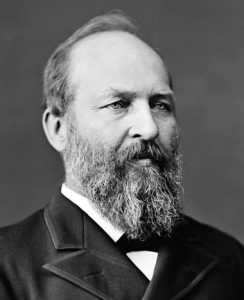 President James Garfield was
President James Garfield was 
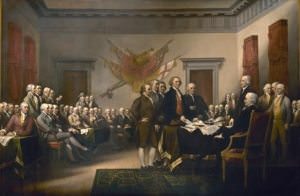 On July 4, 1776 a group of Americans approved a document declaring the United States of America free from English rule. This document was the Declaration of Independence,
On July 4, 1776 a group of Americans approved a document declaring the United States of America free from English rule. This document was the Declaration of Independence,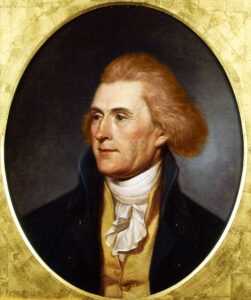 When forced, therefore, to resort to arms for redress, an appeal to the tribunal of the world was deemed proper for our justification. This was the object of the Declaration of Independence. Not to find out new principles, or new arguments, never before thought of, not merely to say things which had never been said before; but to place before mankind the common sense of the subject, in terms so plain and firm as to command their assent, and to justify ourselves in the independent stand we are compelled to take. Neither aiming at originality of principle or sentiment, nor yet copied from any particular and previous writing, it was intended to be an expression of the American mind.
When forced, therefore, to resort to arms for redress, an appeal to the tribunal of the world was deemed proper for our justification. This was the object of the Declaration of Independence. Not to find out new principles, or new arguments, never before thought of, not merely to say things which had never been said before; but to place before mankind the common sense of the subject, in terms so plain and firm as to command their assent, and to justify ourselves in the independent stand we are compelled to take. Neither aiming at originality of principle or sentiment, nor yet copied from any particular and previous writing, it was intended to be an expression of the American mind.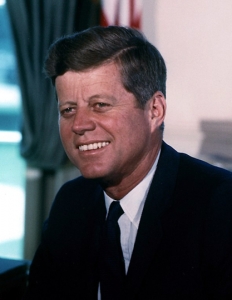 [The] Declaration unleashed not merely a revolution against the British but a revolution in human affairs. Its authors were highly conscious of its worldwide implications. And
[The] Declaration unleashed not merely a revolution against the British but a revolution in human affairs. Its authors were highly conscious of its worldwide implications. And 